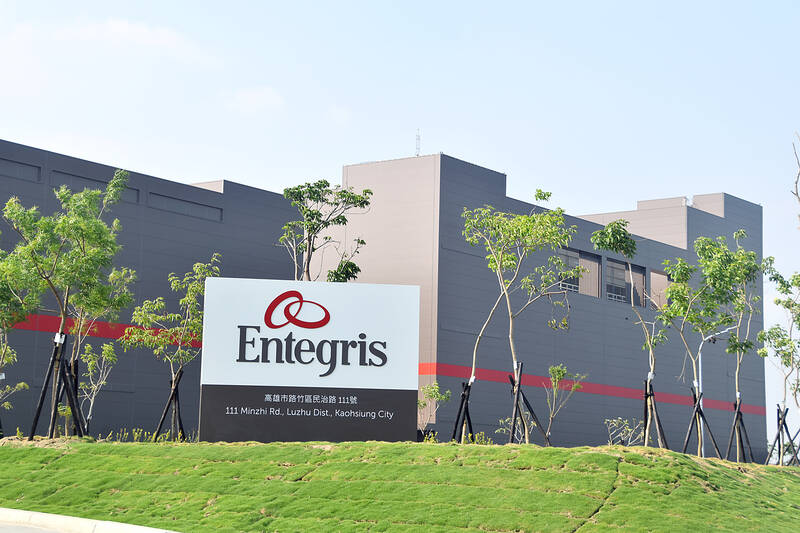Entegris Inc, a supplier of advanced materials and process solutions for the semiconductor and other high-technology industries, yesterday held an opening ceremony in Kaohsiung for its largest manufacturing facility that would produce advanced products such as liquid filters that can be used in 2-nanometer process technology.
The US-based company expects to recruit more than 400 employees for the new facility by 2025, when the US$500 million plant becomes fully operational. The company employs 720 people in Taiwan.
The Kaohsiung factory is forecast to generate US$500 million per year when it is fully utilized, the company said.

Photo: Su Fu-nan, Taipei Times
There is potential for the company to further expand and invest in land adjacent to the fab, it said.
Entegris said it would not scale back investment on research-and-development efforts, nor on capital spending during downturns.
It also operates a research-and-development center in Hsinchu.
“Our new Kaohsiung facility demonstrates our commitment to serving our customers in Asia and supporting the local industry ecosystem,” Entegris chief executive officer Bertrand Loy said. “The expansion of our footprint here helps us provide greater supply security and shorter lead times to customers across the region.”
The Kaohsiung facility is expected to add 20 percent capacity for three major products, including advanced liquid filters, the company said.
Regarding whether Entegris factored in the geopolitical risks in building an advanced factory in Taiwan, Loy said: “There is a lot of nervousness around that... The grand opening of our Kaohsiung facility, it is really a statement of the company’s commitment” to Taiwan.
“We want to be adequately positioned to support our customers in Taiwan and their ecosystem,” Loy said.
Entegris counts Taiwan Semiconductor Manufacturing Co (TSMC, 台積電) as one of its largest customers in Taiwan.
The new Kaohsiung fab is to produce Entegris’ next-generation products for TSMC and its customers in Taiwan, the company said.
The liquid filters made at the fab can be used in 28-nanometer nodes and can be further miniaturized for 5-nanometer, 3-nanometer and 2-nanometer technology nodes, which extreme ultraviolet lithography tools would use, Entegris said.
The company expects the global semiconductor industry would touch bottom this quarter, Loy said.
However, the pace of recovery remains to be seen, he added.
Entegris has been working with local customers and partners in the ecosystem for the past 32 years, during which Taiwan’s semiconductor industry has expanded at an annual compound growth rate of 16 percent, the company said.
Taiwan, in particular, has a dominant position in the world, with a 65 percent market share, it added.

UNCERTAINTIES: Exports surged 34.1% and private investment grew 7.03% to outpace expectations in the first half, although US tariffs could stall momentum The Chung-Hua Institution for Economic Research (CIER, 中華經濟研究院) yesterday raised its GDP growth forecast to 3.05 percent this year on a robust first-half performance, but warned that US tariff threats and external uncertainty could stall momentum in the second half of the year. “The first half proved exceptionally strong, allowing room for optimism,” CIER president Lien Hsien-ming (連賢明) said. “But the growth momentum may slow moving forward due to US tariffs.” The tariff threat poses definite downside risks, although the scale of the impact remains unclear given the unpredictability of US President Donald Trump’s policies, Lien said. Despite the headwinds, Taiwan is likely

When Lika Megreladze was a child, life in her native western Georgian region of Guria revolved around tea. Her mother worked for decades as a scientist at the Soviet Union’s Institute of Tea and Subtropical Crops in the village of Anaseuli, Georgia, perfecting cultivation methods for a Georgian tea industry that supplied the bulk of the vast communist state’s brews. “When I was a child, this was only my mum’s workplace. Only later I realized that it was something big,” she said. Now, the institute lies abandoned. Yellowed papers are strewn around its decaying corridors, and a statue of Soviet founder Vladimir Lenin

UNIFYING OPPOSITION: Numerous companies have registered complaints over the potential levies, bringing together rival automakers in voicing their reservations US President Donald Trump is readying plans for industry-specific tariffs to kick in alongside his country-by-country duties in two weeks, ramping up his push to reshape the US’ standing in the global trading system by penalizing purchases from abroad. Administration officials could release details of Trump’s planned 50 percent duty on copper in the days before they are set to take effect on Friday next week, a person familiar with the matter said. That is the same date Trump’s “reciprocal” levies on products from more than 100 nations are slated to begin. Trump on Tuesday said that he is likely to impose tariffs

READY TO BUY: Shortly after Nvidia announced the approval, Chinese firms scrambled to order the H20 GPUs, which the company must send to the US government for approval Nvidia Corp chief executive officer Jensen Huang (黃仁勳) late on Monday said the technology giant has won approval from US President Donald Trump’s administration to sell its advanced H20 graphics processing units (GPUs) used to develop artificial intelligence (AI) to China. The news came in a company blog post late on Monday and Huang also spoke about the coup on China’s state-run China Global Television Network in remarks shown on X. “The US government has assured Nvidia that licenses will be granted, and Nvidia hopes to start deliveries soon,” the post said. “Today, I’m announcing that the US government has approved for us